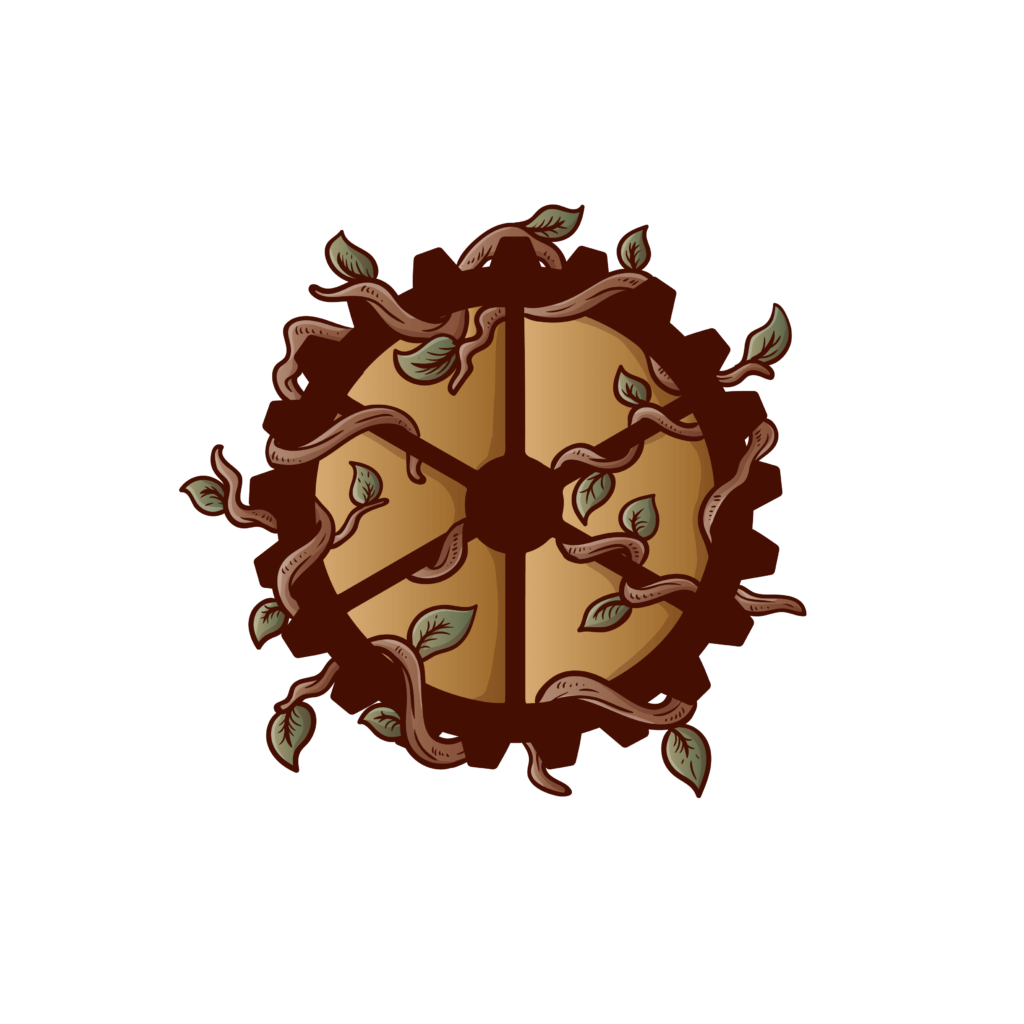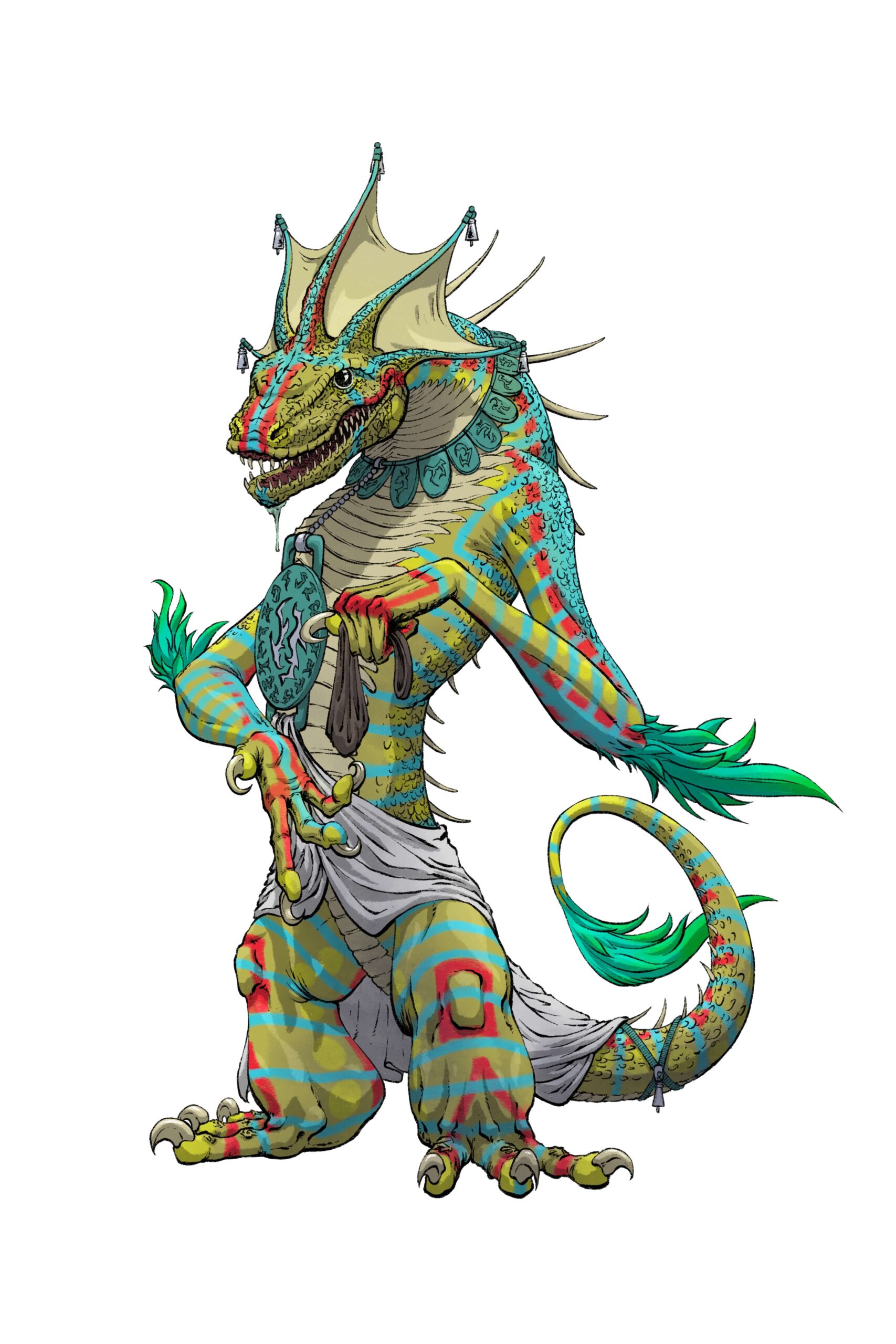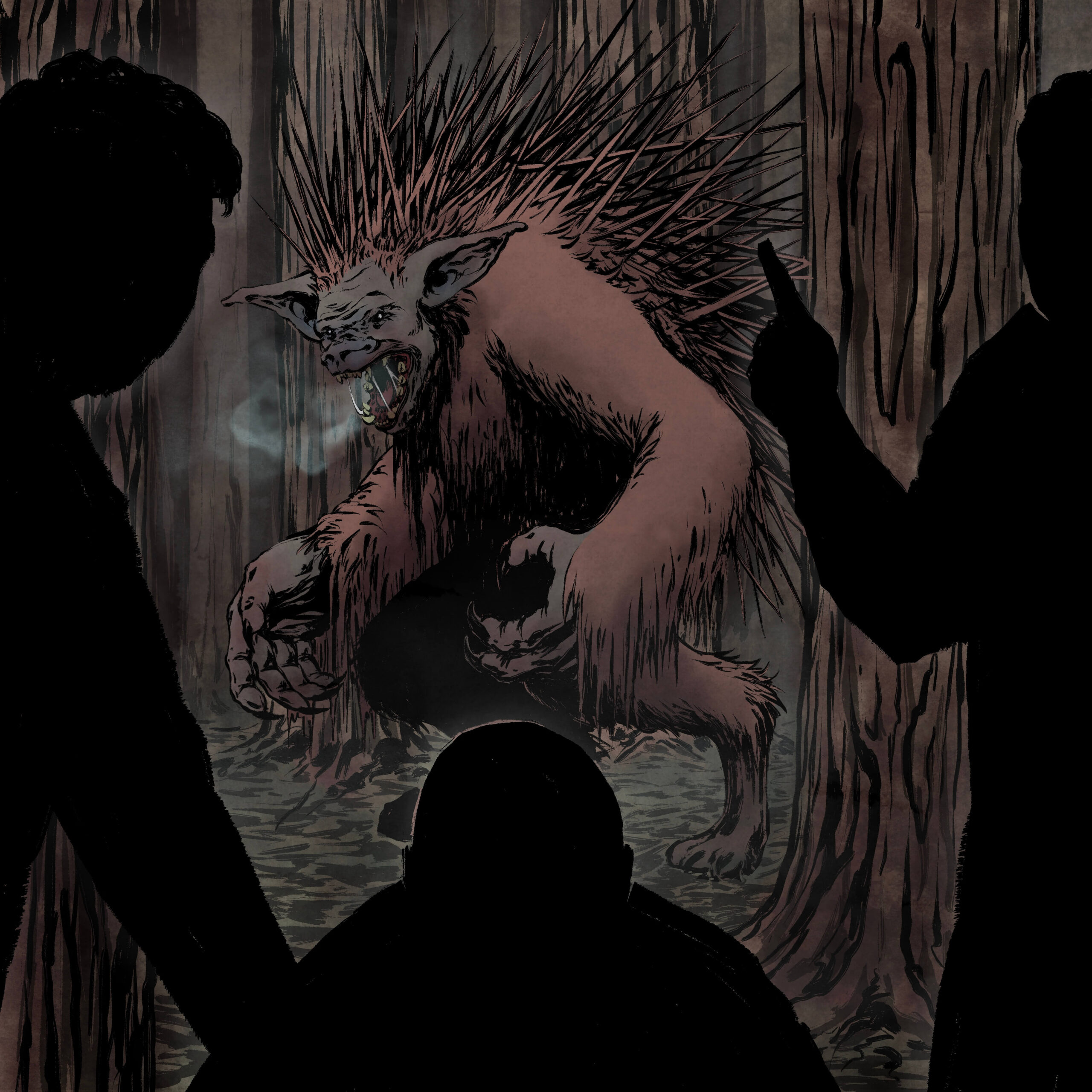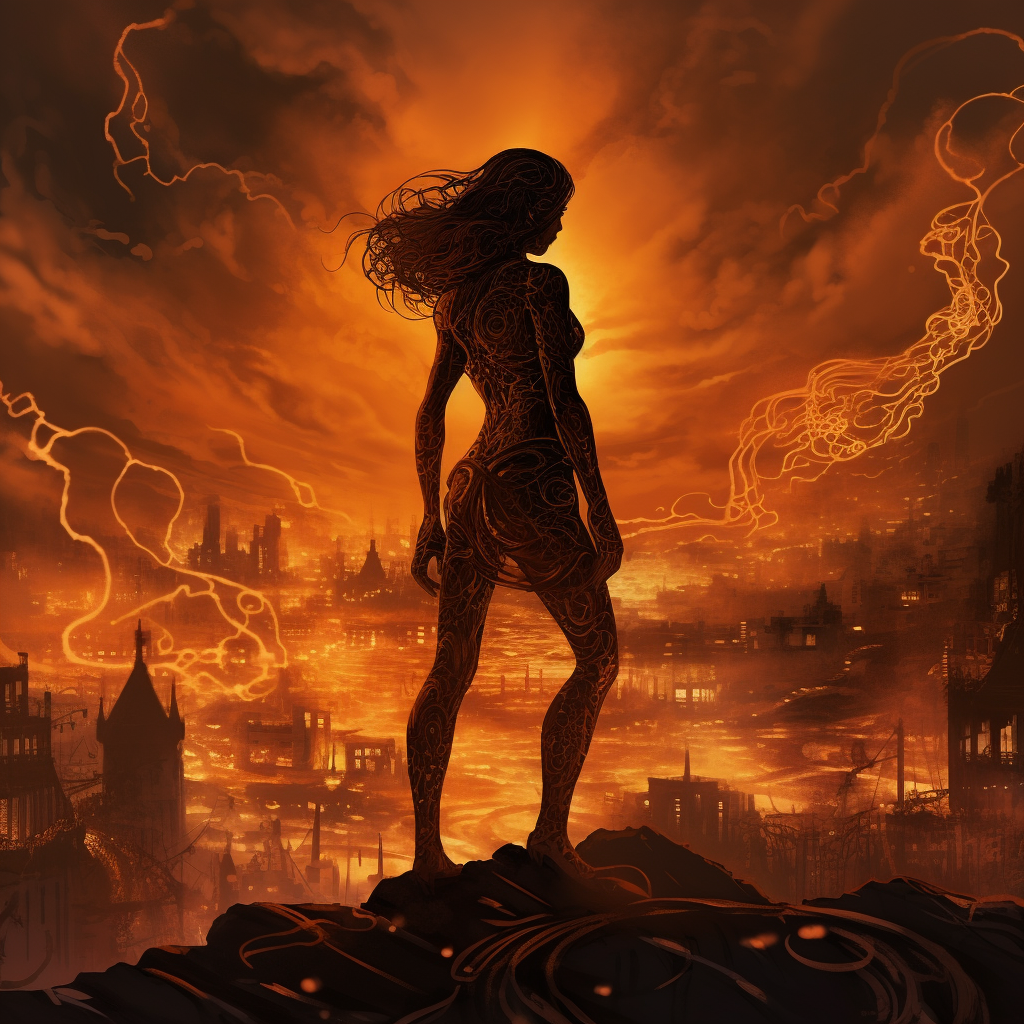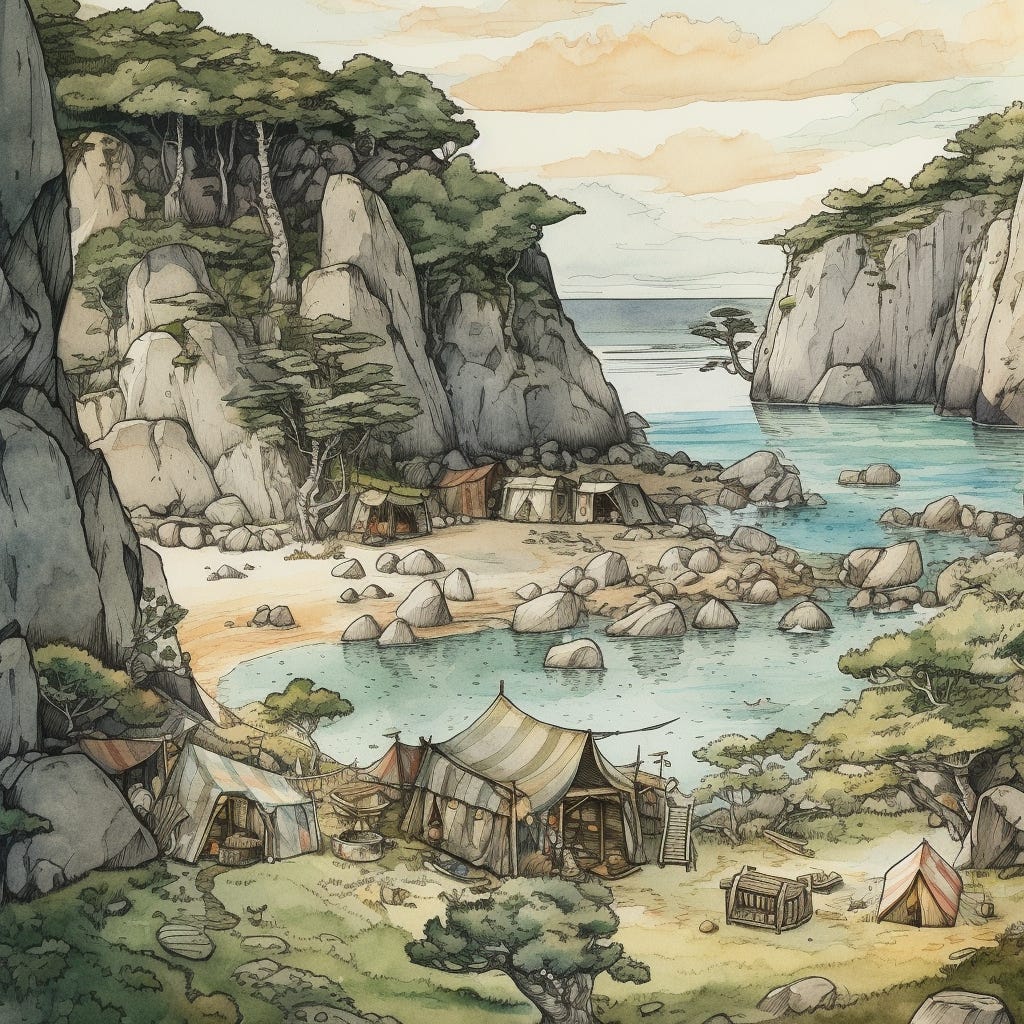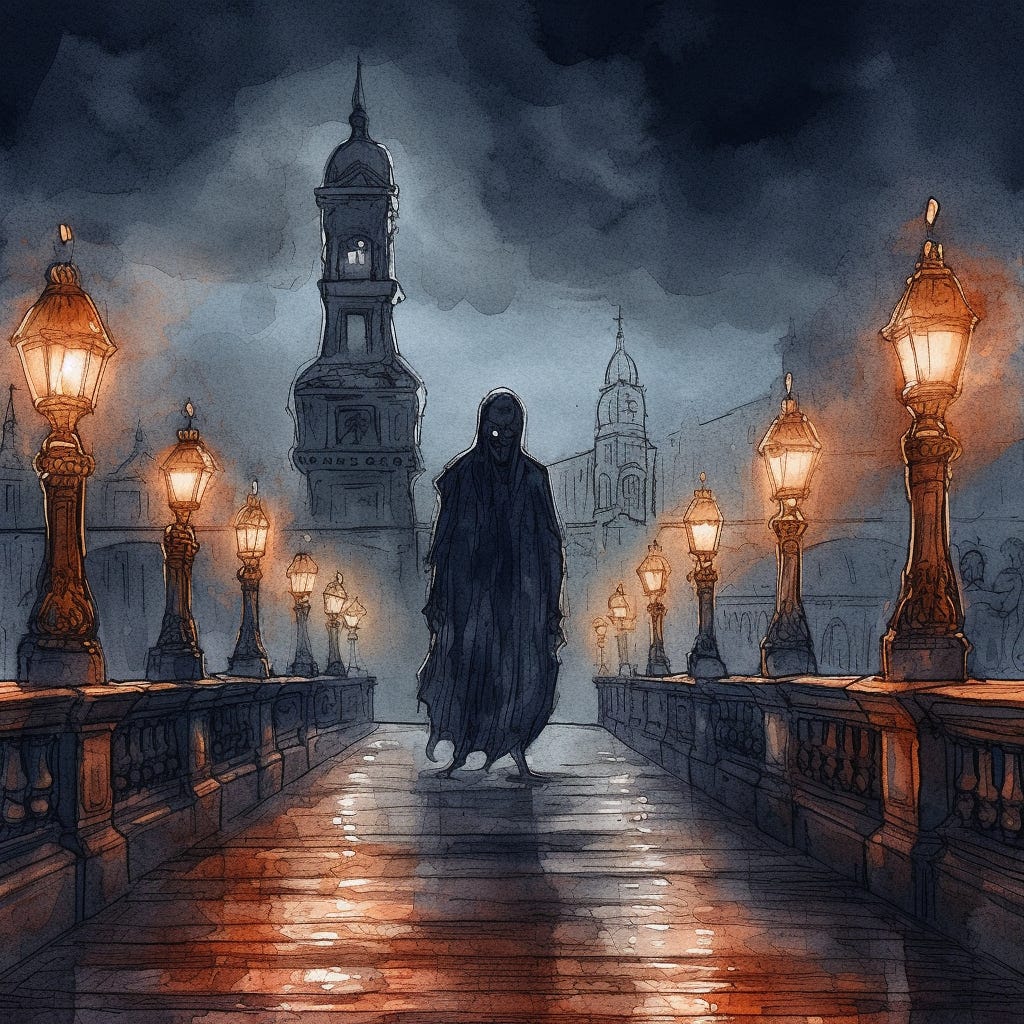Rishne at the Bone Gates
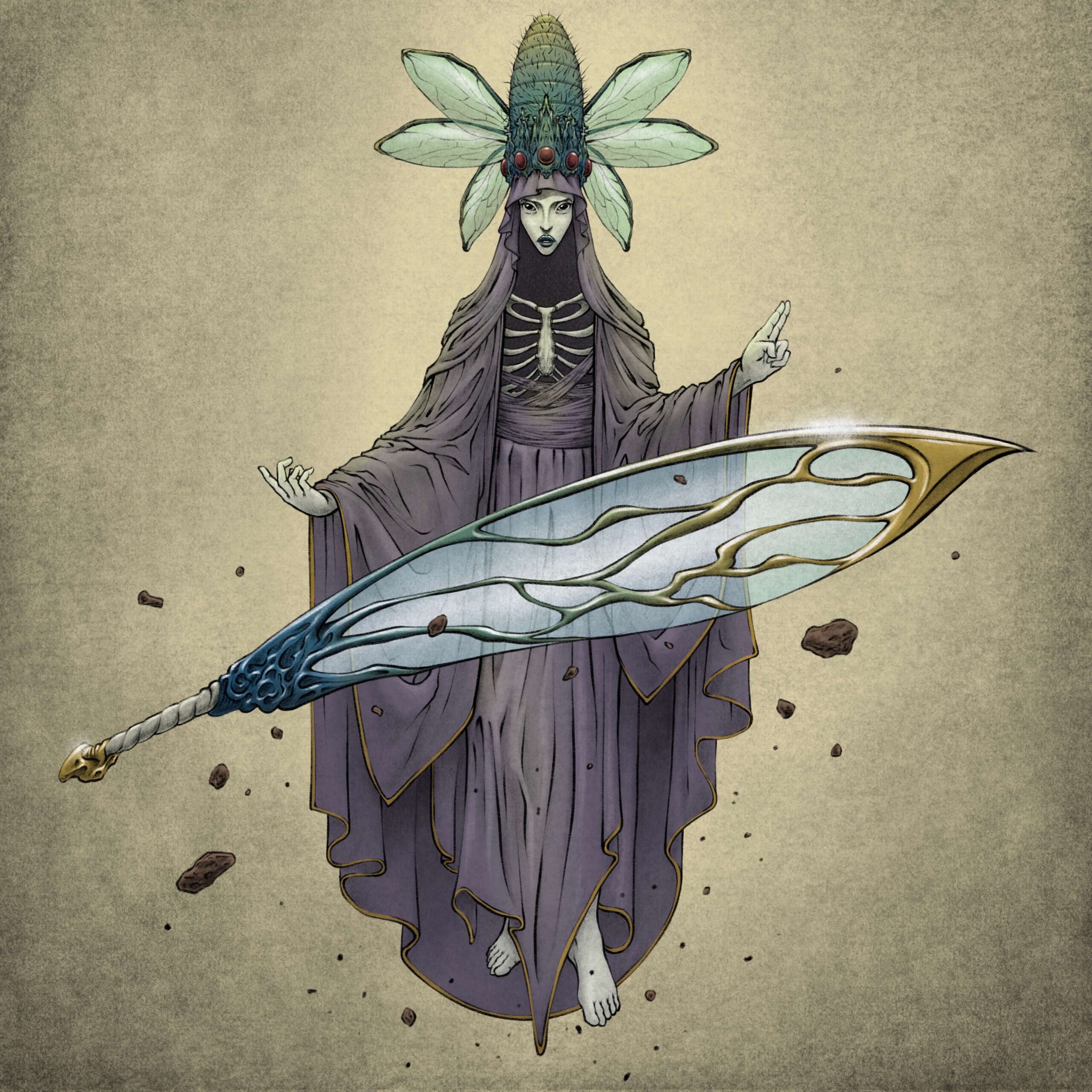
Princess Rishne grew up with the war cries.
She was born in the waning years of the long and grueling war with Mard, though she would not have known it. Night winds carried the shrieks of ambushed soldiers to her crib; artillery punctuated her lessons and sent her tutors scrambling; the moans and wails of legionaries — captured or dying or both — echoed through the streets of Amalcross alongside her footsteps.
The war had consumed three generations of Amal youth and looked to claim more. But in the war’s fourth decade, both sides could sense the turning tide. Amal glimpsed the first light of victory as if a glint from a rusted sword. Mard felt the first prick of defeat like a wayward needle in a velvet shawl. And thus both sides dug in deeper, straining against inverse hopes.
Who could blame Princess Rishne ‘ja Faison, the eldest daughter of Emperor Kaluan ‘ja Faison and claimant to his rule, for taking up arms on her seventh year? How he begged her to join him on his throne, so she would learn to govern rather than to kill. But she always refused. And how he begged her to grow learned in the arts! Kaluan loved singing and dancing, and high drama and low farce. Indeed, it was not a nurse but Kaluan who sang lullabies to Rishne, and then to each of her sisters, night after night to wash the blood from their dreams. The war had made Emperor Kaluan older than the oldest hermit, and the endless slaughter tore at his soul like vultures at a feast. How he grieved for each of his fallen subjects!
But Princess Rishne had a gift for sword and strategy; even Kaluan could not deny it. Each morning, she strapped armor atop her amber tunic and prayed to Quatha, that great goddess of war and strategy; each day, she trained harder than the most hardened soldier; each night, she burned through a dozen candles studying the greatest generals’ tactics. Soon, Rishne was known as the Warrior Princess of Amal, mistress of musket and sword, and it was said even the Mardians heard her name and trembled.
One morning, as Rishne led the men and women of her legion in prayer to steel-shrewd Quatha, the cerulean skies turned gray and black, and a woman — tall and pale and dressed in heavy purple robes, with lips as blue as the bottom of the sea — rose from the earth. “Quatha!” the troops gasped. “She is come to grant us warlust!”
But Princess Rishne saw the grass brown and stiffen, and smelled the perfume of dry earth, and knew the sky above them was a sight from the land of the dead. She felt her own dark skin recoil.
“No,” Rishne said, “this is Polmos, goddess of life and death — come to drive us to her Deathless Fields.”
Her legionaries cried out in anguish: Death, here for them so soon?
Rishne dropped to her knees and pressed her forehead to the ground, awaiting Polmos’s bitter-pleasant sting.
“Rise, Rishne ‘ja Faison,” Polmos said. “You must yet stalk your victory and your throne before you die.”
Rishne brought her eyes to Polmos’s and stood. Though she had never before felt fear of death, now she trembled.
Polmos drew a greatsword from the earth. It hummed like a master bard, the air quivering around it. “This sword to thee I grant,” Polmos said.
Rishne approached Polmos, and the smell of ancient loam overwhelmed her. She took the hilt from Polmos, but the goddess drew her in close.
“None shall stand before you, and you shall rule,” Polmos whispered. She unhanded the sword and dropped to her knees. “But I warn you, Warrior Princess: Only you may choose your realm.” And thus, the goddess of life and death was gone, and the grass renewed, and the day turned bright and cheerful.
As those strange words rang in her ears, Rishne saw her legionaries press their heads to the ground around her. “Even the goddess of death bows before our future Empress!” they cheered. “Princess Rishne shall lead us beyond victory!”
⚙︎⚙︎⚙︎
Every schoolchild in the Empire knows the feats of Princess Rishne’s legion, as well as the Warrior Princess’s kindness to refugees, orphans and even those made prisoner of war. And all know how she met autumn-haired Willem Qoyle during the Battle of Booley Swamp. But few know that one sultry night Fen — patient god of harvest and fertility — marked them for a summer bounty in his almanac. Even before the battle was won, Emperor Kaluan learned of Rishne’s intention to wed Willem.
What could Kaluan have thought? Surely, his joy at his favored daughter’s betrothal was tempered by her suitor’s ignoble standing. Surely, he knew the Hundred Houses would whisper about a commoner’s betrothal to a princess they already thought brash and uncouth. Yet, Kaluan surely knew his summons to the Deathless Fields drew near as well, for his body grew frailer and his memory ever more clouded, confused, labyrinthine. And watching Rishne lead her once-more victorious legion across the Strait, the citizens cheering his daughter and showering her leafy-haired love with flowers, surely he knew she would make a wise and generous empress.
That night, he gave the royal couple his blessing and announced his intention to endow the throne to Rishne. She and Willem would wed before the Stone of Cogidubnus, upon which all Amal rulers have sat since the stonelaying.
But the eve before the nuptial ceremony, when the sky was so black even the stars were snuffed, a grim platoon of Mardians snuck through Amalcross. Though their aim was for Rishne, it was Willem upon whom they fell. Willem and his mates — exhausted from battle and celebration, heavy with food, loose with beer and spirits — stood no chance. The slaughter was quick and ruthless.
Beholding the scene and Willem’s flayed body, Rishne fell. She crawled across the floor, blind from the steam of hot blood spilled in winter. She dragged herself across the bodies. She shrieked Willem’s name into his tightening lips. She tore her tunic and held him against her breasts. Her sisters tried to calm her, but Rishne’s skin was so slick with gore no grip would hold. She tumbled always down: Back into the cooling arms of her lover; back atop his dashed and knife-torn chest.
⚙︎⚙︎⚙︎
Some say it took days for the Warrior Princess to regain her senses. Others say weeks. When she did, she covered herself in ash, barred herself within her chambers, and invoked Polmos.
She howled the goddess’s name endlessly, her cries ringing from her high tower throughout Amalcross.
But Polmos withheld her audience. Rishne offered blood sacrifices from the prisoners she’d once shown mercy. She offered her own blood, as well. Her legion was forlorn and disturbed: Would their Warrior Princess ever return to them? Her father the Emperor — when he could find his way through his own mind — begged her to move beyond grief and claim her throne. But as she did when she was a child, she refused him.
Finally, on the first day of spring, the sky darkened and a smell of old clay filled Amalcross. The princess, her belly beginning to swell with child, felt her skin roil as the goddess of life and death rose from the floor of her bedchamber.
“Rishne ‘ja Faison,” Polmos said, “why cry you for me? Already you wield one of my gifts and bear yet another.”
“I seek my prince,” Rishne said.
“Your prince is dead,” Polmos said.
“I want him back!” Rishne said.
“Even if they could,” Polmos said, “not all shades return to life so willingly.”
“What in death would not seek life?” Rishne demanded.
Polmos did not respond.
“Charm his shade,” Rishne continued, “so he may return to me.”
“I shall not subvert my own domain,” Polmos said.
Rishne drew the greatsword Polmos had given her so long ago. The sword hummed in the presence of its mistress. “With this, you said, none shall stand before me.”
“I do not lie,” Polmos said.
“Give me Willem,” Rishne said. “I’ll not stalk my throne until you do, and thus I cannot die. I would slay you and all my dead again for him.”
The two women — one a great warrior, one a great goddess — considered each other.
“Your life leads where you choose,” Polmos said.
Polmos withdrew. Rishne leaped for her, cleaving the air, but already the sun shone again.
Rishne tore from her chambers. She roused the Amalguard and her own legion. But what joy they felt at seeing her again was quickly tempered.
“Bring me the Imperial Magus,” she said, “and rally yourselves, for we march at dawn.”
“But Princess Rishne,” one advisor said, “Mard’s defeat is near. Would you not better serve Amal if you claimed your father’s throne?”
“We march not on Mard,” the Warrior Princess said. “We march on the domain of Polmos.”
⚙︎⚙︎⚙︎
It is said the living may walk amongst the dead if they survive the journey. Armored with the knowledge of Polmos’s prophecy, Rishne prepared to take the Deathless Fields.
Rishne’s legion was encamped in Cancer’s Crux, that lifeless land in the shadow of the Suncleft Mountains. For three months, Rishne had followed the song of her greatsword: As it hummed when Polmos first delivered it to her, so it sang louder as Rishne neared, then encircled, and then entered the Crux.
Now, she and her troops stood outside the yawning mouth of one of the Crux’s thousand caves — this one making the greatsword reach its highest note. And thus, Rishne knew it hid the Bone Gates that Polmos had erected to keep in her dead and keep out her twin goddess cousins. But with the Imperial Magus’s forbidden spells, Rishne would shatter the Gates if necessary.
The Warrior Princess wound her brown hair into a knot and threaded it with purple lace. Over her now-black tunic she donned her armor, widened to protect her unborn child. Then she led her legion into the depths.
They were forced to leave their horses and artillery but carried with them their maces and muskets, blades and bombs. For three days they descended in total darkness: The caverns were so stifling even enchanted flames would sputter out. The passage narrowed, and they stumbled over loose rocks and misplaced feet, their breath ever heavier with a heat that felt like thick fog.
On the fourth day, a pale blue glow revealed itself in the distance. Rishne knew this was the light from the Bone Gates.
The Warrior Princess ordered the Imperial Magus to raise enchanted flames once more, since no god would tamper with the Meridian so close to their own domain.
The legion’s torches leapt alive. Immediately, Rishne’s legionaries cried out.
The cavern had not narrowed but widened. It was now crowded with thousands of people surrounding them!
Yet Rishne understood. During their long march, they had been joined by the ever-growing ranks of the dead. Some were children, others were very old; still others looked to be from lands unknown. Many wore Amal armor, and many more bore the emblem of Mard. And she could see yet new shades secreting from the crevices like the trickle of water through a dam.
“They are shades of the war dead!” Rishne cried to her legion. “Already struck down in battle above, they can do us no harm below!”
It is true: Shades can do no physical harm to the living. These shades shuffled forward, so fresh and morose in death they paid little attention to the band of living amongst them.
Rishne and her legion continued their march on the Bone Gates with this silent procession. As they approached, they could see the figures of Mactwk and Ohrnull, the Gates’ cursed guardians. Mactwk wept as he dabbed honey on the tongues of the newly dead; Ohrnull sulked and leered.
Rishne thought she and her legion could sneak beyond the Gates if they accepted Mactwk’s sympathies. She corralled her troops into a line. They filed toward the guardians, leaving one of the newly dead between each.
Rishne approached Mactwk first and opened her mouth. The guardian’s eyes were so wet and bloodshot, she was not sure he could see her. But he placed a thumb of honey on her tongue, sticky and too sweet. She faced the Bone Gates, and they peeled back for her as if made of cooking flesh and not fused bone — revealing the Deathless Fields. She stepped forward.
“Princess,” hissed Ohrnull. He held her back with calloused hands lingering too long and too heavily on her shoulders. “You may pass, but alone.”
The Warrior Princess did not flinch from his creeping touch. “You shall unhand me,” she said, “and allow us to pass.”
Ohrnull smiled. His pocked tongue slid across a set of sanded yellow teeth. “I take orders from a queen,” he said, “not a girl who plays amongst bones.”
“Please, your highness,” Mactwk blubbered behind Rishne, “it doesn’t have to be like this.”
“You two are cursed, not dead,” Rishne said, “though I can perform those honors if you wish.”
Ohrnull snapped for her, but Rishne leapt back. In a heartbeat she’d drawn her greatsword.
Ohrnull groped for the scorpion’s stinger with which he’d long ago been cursed. But Rishne severed it. She dodged a jet of blood and shimmering venom as Ohrnull clutched his groin. He screamed only once before Rishne beheaded him.
Mactwk dropped his jar of honey. “Brother,” he said.
Rishne flung the blood from her greatsword, its hum filling the cavern with an endless ringing.
“Administer the honey so the Bone Gates may open,” she said.
Mactwk stared at Orhnull’s head, its jaw still working. “I will not,” Mactwk said. “The Gates lie open for you alone. That is enough.”
“Then I shall slay you too,” Rishne said.
Mactwk said nothing.
Rishne could see Ohrnull’s shade beginning to percolate. Mactwk dipped a finger into his honey jar. But before he could place the honey on his newly dead brother’s tongue, Rishne beheaded Mactwk, too.
“Magus!” she said. “Do your work.”
When the Imperial Magus was done, the Bone Gates had shattered into a million sharp blue embers — quivering and inching backward, slowly rebuilding the Gates of their own volition. As the brown haze cleared and the smell of ash and sulfur dissipated, Rishne could see Polmos’s halfdead forces rise in front of them: The rotting wriggling limbs that tear and feast upon flesh.
“Legionaries!” the Warrior Princes roared, brandishing her greatsword.
“HUAH!” they all replied.
“CHARGE!”
In all her campaigns, Princess Rishne had never met defeat. When the fighting ended on those Deathless Fields, Rishne knew this was no different. She mustered her legion for roll call, since in war nothing is gained without loss. And as each of her men and women formed up, the Warrior Princess’s heart swelled further. Her love for her legionaries was as boundless as their bravery and skill, and it seemed they all survived the onslaught.
Rishne could see the Bone Gates reconstructing. Shades she thought would be free of their call to the Fields pressed through, for some reason still compelled to join the ranks of the dead.
And Rishne realized some of the shades doing so were those of her own legionaries.
When her legion mustered in full, Rishne saw it clearly: Only she had fought the halfdead horde and lived.
Rishne fell to her knees. She knew some would die. But her entire legion?
“You have served me well,” she said to them, “better than any general could have asked. I bid you go — free and unburdened from my service. Return to the living before the Gates keep you here forever. Return to your families and your joys. Leave me to my own trials.”
There was a silence and a stillness only the dead can offer. Finally, the Imperial Magus’s shade spoke.
“We follow where you lead, Rishne ‘ja Faison,” he said.
Rishne looked over her legion. She watched the fledgling Bone Gates rebuild.
“Forgive me,” she said.
⚙︎⚙︎⚙︎
The Deathless Fields are boundless. The Deathless Fields are infinite. Princess Rishne wandered them, calling her lover’s name amongst the uncountable mulling dead. Her legion followed.
Her voice grew hoarse. Her skin pulled tight. Her hunger and thirst were unbearable. There is nothing for living beings to eat or drink in the Deathless Fields. What good is sustenance to a shade?
There is no sun in the Deathless Fields, and neither stars nor moon. Instead, that stagnant land has only an abyss into which nothing may rise and from which nothing may fall. When she saw it during Polmos’s visitations, it had filled Rishne with purpose. Now, it filled her with ambivalence.
Time, too, does not exist in the Deathless Fields. But after seven of our days, Rishne found Willem Qoyle sitting amongst the mates with whom he’d died. Her heart leapt at the sight of him.
“My love,” she said. She dropped to her knees before him.
He gazed at her as if his eyes could not focus — or as if he could see right through her.
“It is your Princess Rishne.”
“Rishne,” he said. His mates swayed, though no wind blew.
“Follow me,” Rishne said, “and I will lead you home.”
“Home,” Willem said.
“To Booley,” Rishne said, “or Amalcross, or wherever you wish. Please, Willem. Rise.”
“Rise,” Willem said.
Rishne wrapped his hands in hers. She stood, raising him with her.
Willem’s mates opened their mouths in silent unison.
Rishne took one step and then another. So did Willem, but heavily. Each time his foot rose, it fell harder than the last. On the third step, he would move no further.
Rishne tugged him, her legionaries watching vacantly. Behind him, she saw his mates now standing but otherwise unmoved. Willem followed her gaze.
“No,” Rishne said, “do not look at them. Come with me.”
Willem faced her again. They stepped forward once more. But again, he froze.
“Willem,” Rishne said, “with me!”
She coaxed him forward yet another step. Yet again he stopped. He strained to face his mates once more.
“You must forget them!” Rishne cried, gripping his cheeks. “They are dead!”
“Dead,” Willem said.
“We will live,” Rishne said. “Together, we three shall live.”
“Dead,” Willem said, so low she almost could not hear.
With impossible strength, he twisted free and lumbered for his mates. She watched him sit amongst them once more. It was then Princess Rishne knew her love would not leave with her.
There was a prickling along her skin, a feeling Rishne had only felt twice before. She felt the baby in her womb kick. The smell of ancient soil overwhelmed her and caused her eyes to further sting. Rishne steeled her tears and faced the goddess of life and death, now sitting before her on a seat of clay.
“Have you come to gloat, great goddess?” Rishne spat. “Behold the Warrior Princess of Amal, laid low by death.”
“Death brings all low in time, Rishne ‘ja Faison,” Polmos said, “and I did not bring you here.”
“Shall I beg you then?” Rishne said. “Shall I grovel and ask that you return Willem to me?”
“You may,” Polmos said, “but it will change nothing.”
Rishne laughed.
“Rise, then, goddess,” the Warrior Princess said. She unsheathed the greatsword, now singing. “Let us see the truth of prophecy. Without Willem, I’ll seek no throne. If I slay death, will the dead live again so I may rule? Or does death lie like men desperate to live?”
Polmos rose. She approached Rishne.
“Life does lie because it can,” Polmos said. “Death tells truths because it must.”
The words had barely left Polmos’s lips when Princess Rishne impaled the goddess with her greatsword.
Rishne’s warcry lurched into a yelp. She felt the sword drive through Polmos’s body — and pierce through Rishne’s own. The Warrior Princess could feel the greatsword vibrating in her grip — and through her own ribs. There was a great pain, towering and shifting, in her stomach. She watched the heat of her blood turn cold — felt the red of her blood turn black — as it raced across the sword, somehow from her and to her.
The greatsword’s song pitched beyond the unbearable until her vision seared with sound and —
— SNAP —
— the greatsword cracked in the middle. Where blood once ran now rust so threaded. Its song sharpened to a shriek.
And then the greatsword dissolved into ash, as did its notes.
The pain and the sound subsided. The blood dried. When she could see again, she could not see Polmos.
But she could sense the shades around her — could read their sullen thoughts, feel their final wounds, glimpse their last living sights. She could track their unending march toward the Bone Gates — many nursing the agony and shame of the vanquished, and others still groping for the victory within their reach.
She knew, somehow, the shades were coming to her.
And yet… there was one presence here she could not permeate. Emitting a sound that did not belong here. Cushioned by lush grass and soft petals that should not grow here.
At her feet lay a wailing, living newborn.
She wrapped the child in her purple robes — had she always worn such robes? — and then saw a legion of kneeling souls before her. In front of them stood the shade once named Willem Qoyle. She felt something stir at the sight of him.
“My Queen,” he said. He bowed.
“Queen?” she thought. The ochre throne beckoned behind her. And suddenly she remembered.
She had been so many things. Yes: Once she was even a great warrior princess, whose newborn daughter she now held in her arms and whose vanquished legionaries now bowed before her. Joining them were others, from both sides of that great conflict in the living world. So much had happened — so much could have happened — and so much would happen still.
But she was not a princess any longer: She was a Queen.
“Rise,” Polmos said. All the dead before her did.
So too rose a new moon above those Deathless Fields, so there would always be light in the darkness for the living daughter of death.
And so too would a new sun follow, so there would be flowers and laughter for the living daughter of death, and joy and peace for all those righteous and good in life.
⚙︎⚙︎⚙︎
Meanwhile, a man stood confused in a great marble hall. There was motion and music everywhere. Someone kept pulling him to sit, but he refused. Where was his daughter? He grabbed a boy who scurried in front of him.
“Child,” the man said, “why do the bells ring so bittersweetly? How am I to sing to little Rishne with such a tune?”
The boy looked wildly at the strangers surrounding the man. There was a heavy silence, despite all the noise. The boy wiped his eyes.
“Child, speak,” the man said. “Why do you cry?”
“Emperor Kaluan,” the boy said to him, “the bells ring thus because the war with Mard is won, but the princess is lost.”
